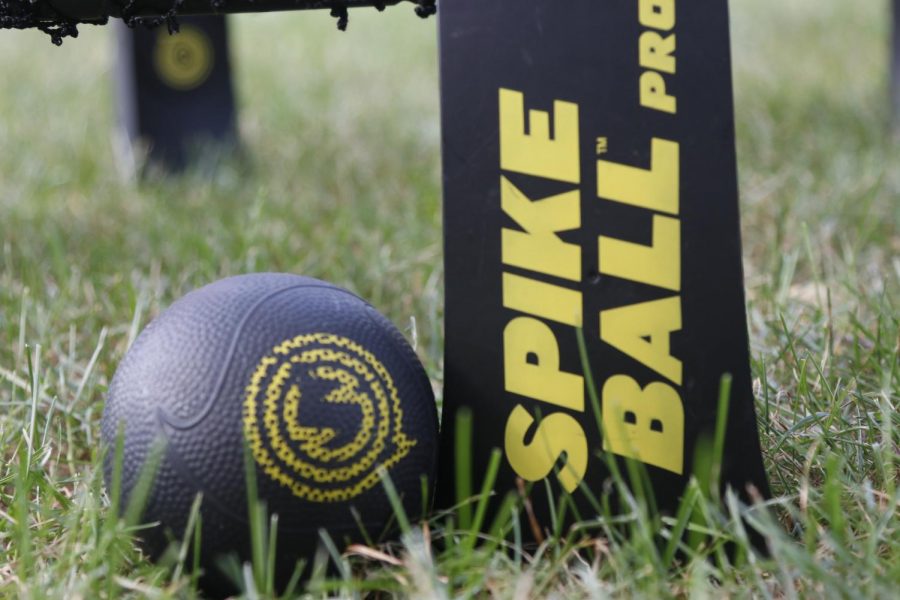Almost one year ago, Marquette Spikeball™ Club’s Instagram received a direct message from the Spikeball™ Roundnet Association.
“Hey, we love everything that you are doing to further the sport of roundnet towards global domination!” the message began.
But the message continued as a request finished with an emoticon sad face.
“We need you to change your title, any branding and online presence (social media, website, etc.) from ‘Spikeball™’ to ‘Roundnet.’ If we allow unauthorized use of our trademarked brand name, we risk losing our trademark. :(”
The Spikeball™ brand, whose founder and CEO is Marquette College of Communication alum Chris Roker, has been controlling their image more tightly. Their website offers gives a user’s guide to differentiate between Spikeball™, the brand, and roundnet, the sport.
The direct messages and other communication methods are all to prevent the loss of their trademark. Imagine “Spalding” instead of basketball.
This isn’t new. “Genericized trademarks” have affected other brands like trampoline, laundromat and even heroin.
Thus is the story of the birth of Marquette Roundnet Club.
With their new name and a year where club sports are back underway after they were shut down due to COVID-19, Sept. 19, the Marquette Roundnet Club’s Instagram announced a tournament at Norris Park the following Saturday, Sept. 25.
“Open to anyone!” the flyer read. It also boasted cash prizes for the top three winners in both the beginner and advanced divisions. The first place team in the beginner category would have won one regular Spikeball™ set and $20. Second place and third place trophy would be $20 and $10, respectively. Then, for the advanced divisions, $50 was the prize for first place. Second would have been $30, and third would have been $20.
Then, two hours before the tournament’s start time, club president Nick Ragonese, a senior in the College of Engineering, sent an email with the subject line “Tournament Cancelled.”
“Only [five] teams signed up…thanks [to] those teams for signing up,” the email read.
“I think it’s a bad weekend. Everyone is going home,” Ragonese said.
In his email, Ragonese mentioned Milwaukee’s Norris Park would still be open from 10 a.m. to 4 p.m. if anyone wanted to stop by to play.
As 10 a.m. rolled around on Saturday, though, the bright sun illuminated a vacant field.
Around 10:15 a.m., teammates Matt Conley, a senior in the College of Business Administration, and Sam Horvath, a senior in the College of Arts & Sciences, wandered into the park hoping a few people would show despite the cancellation.
“It would have been fun to win some beer money,” Conley said.
The club would have held the tournament if at least 16 teams had signed up. Any less would have constituted a loss of fundraising profit for them. Each player needed to pay five dollars to join the tournament.
However, it isn’t for a lack of interest in roundnet.
On Friday afternoon, the day just before the tournament, a roundnet game popped up by Lalumiere Language Hall where a few people served and chased after the ball. On the east side of the Alumni Memorial Union, four players gathered around another net.
It also isn’t a lack of members in the club. According to Ragonese, the email list has 200 people, 50 of whom made an appearance at the first practice Sept. 13.
“A lack of communication is the problem,” Horvath said, but he couldn’t give a solution.
The tournament announcement had less than a week’s notice. Ragonese promised to try to have another tournament in the spring. He said he is hoping for an April date with warmer weather.
As Conley, Havroth and Ragonese theorized why this date didn’t draw a large enough crowd, they also reminisced on why they originally joined and why they come back.
Conley figured it would be a good way to meet people.
“We’re a pretty tight group,” Conley said. “It’s always nice to show up to practice to forget about school and mess around.”
During his first year, the club hosted the Great Lakes Roundnet Sectional Sept. 8, 2018. Attendees included schools as big as Iowa State University and as small as Dordt College in Sioux Center, Iowa.
Conley and Havroth were partners for that first tournament and had signed up together for this tournament, too.
“It’s a good opportunity to get out early in the morning. It’s a pretty chill club,” Hovrath said.
Hovrath said he also thinks skill level doesn’t matter, and Ragonese agrees.
“If you’re going to play, you might as well do it with us,” Ragonese said. “We have prosets, we have people to play against too … There [are] really no barriers; you can just show up.”
Ragonese also loves how dynamic the sport is. The rules and play style of roundnet are constantly changing. The Spikeball Roundnet Assocation’s website offers an option for people to submit questions on plays.
“There’s obviously strategies better for some people than others, but there’s really no one way to do it.” Ragonese said.
Looking at the future of Marquette Roundnet Club, Hovrath suggests focusing on underclassmen.
“Most members are seniors and juniors. We’re looking for some other guys to step up,” Hovrath said.
On Marquette Roundnet Club’s executive board, only Scott Bates, the treasurer, is not a senior. But he’s still an upperclassmen — a junior in the College of Arts & Sciences.
As for the immediate future, Conley focuses on his excitement.
“I’m looking forward to doing the same thing we’ve been doing for three years.” Conley said.
This story was written by Randi Haseman. She can be reached at [email protected].

